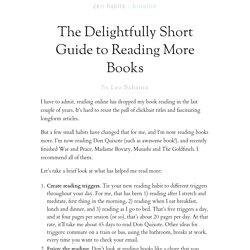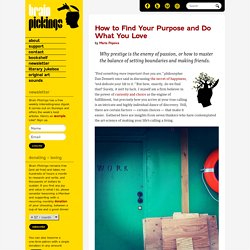

Inspiration. Things to Learn. Willpower & Motivation. Habits. Social. School of Life. How To Stop Being Lazy And Get More Done - 5 Expert Tips. Before we commence with the festivities, I wanted to thank everyone for helping my first book become a Wall Street Journal bestseller. To check it out, click here. Some days the to-do list seems bottomless. Just looking at it is exhausting. We all want to know how to stop being lazy and get more done.
I certainly want the answer. So I decided to call a friend who manages to do this — and more. Cal Newport impresses the heck out of me. He has a full-time job as a professor at Georgetown University, teaching classes and meeting with students.He writes 6 (or more) peer-reviewed academic journal papers per year.He’s the author of 4 books including the wonderful “So Good They Can’t Ignore You.” And yet he finishes work at 5:30PM every day and rarely works weekends. No, he does not have superpowers or a staff of 15. Maslow's Hierarchy of Needs. Improve Your Life: What 10 Things Should You Do Every Day To Improve Your Life?
10 things that scientific research shows can help improve your life. 1) Get out in nature You probably seriously underestimate how important this is.

(Actually, there’s research that says you do.) Being in nature reduces stress, makes you more creative, improves your memory and may even make you a better person. 2) Exercise We all know how important this is, but few people do it consistently. Fixed vs. Growth: The Two Basic Mindsets That Shape Our Lives. “If you imagine less, less will be what you undoubtedly deserve,” Debbie Millman counseled in one of the best commencement speeches ever given, urging: “Do what you love, and don’t stop until you get what you love. Work as hard as you can, imagine immensities…” Far from Pollyanna platitude, this advice actually reflects what modern psychology knows about how belief systems about our own abilities and potential fuel our behavior and predict our success.
Much of that understanding stems from the work of Stanford psychologist Carol Dweck, synthesized in her remarkably insightful Mindset: The New Psychology of Success (public library) — an inquiry into the power of our beliefs, both conscious and unconscious, and how changing even the simplest of them can have profound impact on nearly every aspect of our lives. One of the most basic beliefs we carry about ourselves, Dweck found in her research, has to do with how we view and inhabit what we consider to be our personality. 13 Things That Are Stressing You Out And Making You Less Productive. Ever wonder what makes you stressed and less productive?

I’ll tell you. It’s having a lack of focus. 13 Things Mentally Strong People Don't Do. Mentally strong people have healthy habits.

They manage their emotions, thoughts, and behaviors in ways that set them up for success in life. Check out these things that mentally strong people don’t do so that you too can become more mentally strong. 1. They Don’t Waste Time Feeling Sorry for Themselves Mentally strong people don’t sit around feeling sorry about their circumstances or how others have treated them. 2. What uncomfortable things such as cold showers can improve your life? How to Make a Bucket List You’ll Actually Do: A Comprehensive Guide. There is only one success: to be able to spend your life in your own way. ~ Christopher Morley The principle of the life list is simple.

You list all the things you want to do in life, and cross them off as you do them. Try to do them all before you die. It’s easy and fun to make one, but to create a list of dreams that will actually come true is not quite as simple as merely writing down what you want. You may have made a life list before. But not everyone’s list gets abandoned. Even though it includes many difficult and humongous items (for example, number 113 is “Become proficient in the use of a plane, motorcycle, tractor, surfboard, rifle, pistol, canoe, microscope, football, basketball, bow and arrow, lariat and boomerang,”) as of today he’s checked off 111 of his 127 goals, and some are partially complete.
67 short pieces of advice you didn’t ask for. There’s no way for such an avalanche of unsolicited advice to come off as anything but preachy.

But there’s also something appealing about the scattergun approach. Trying on a few dozen ideas in a few minutes will almost always leave you with something you can take to the bank, if you don’t get hung up on what doesn’t resonate. Here are sixty-seven short pieces of advice I either follow, or probably should. Take from it whatever rings true to you, and don’t take the whole thing too seriously.
Have a good week. 1. 2. Experiments. Talk is cheap.

Essential to Raptitude is the idea of experimentation. Concepts and insights can be useful and encouraging, but it is the application of those ideas that effect big improvements in one’s life. It can be very revealing (and fun) to try on a new habit or technique for a week or two (or four), and observe the results. Getting Things Done. The School of Life - Good Ideas for Everyday Life. Grammar Girl - GWS #1897. Posted Sep.18.14 at 09:19 pm I wound up killing a lot of time on Twitter and Facebook asking people to share their grammatical pet peeves to use in today's strips.

Jesus, that recevied more opinions and reactions than most of my cat videos do! Did you hear me? MORE THAN CAT VIDEOS Anyway, most people had the common you're/your and they're/there/their gripes, plus some it's/its thrown in here and there. So instead, I'll just casually drop in these wonderful links for you guys to read at your leisure. Grammar Girl (aka Mignon Fogarty) will always be my hearthrob. The Delightfully Short Guide to Reading More Books.
By Leo Babauta I have to admit, reading online has dropped my book reading in the last couple of years.

It’s hard to resist the pull of clickbait titles and fascinating longform articles. But a few small habits have changed that for me, and I’m now reading books more. I’m now reading Don Quixote (such as awesome book!) , and recently finished War and Peace, Madame Bovary, Musashi and The Goldfinch. Essential Zen Habits of 2014. Five Things You Can Do Instead of New Year’s Resolutions. Tired of the traditional New Year’s resolution to lose weight, get fit, or get out of credit card debt?

Below are five fresh alternatives to help you celebrate yourself in 2013, and get to your goals in 2014. 1. Write yourself a letter from your future self, dated 1/1/2015. Imagine looking back at 2014, from a place of having achieved your most important goal for the year. In your letter, thank your present self for all you did to achieve your goals—and be specific. 2.
How to Find Your Purpose and Do What You Love. By Maria Popova.

Anna Deavere Smith on Discipline and How We Can Learn to Stop Letting Others Define Us. By Maria Popova “What you are will show, ultimately. Start now, every day, becoming, in your actions, your regular actions, what you would like to become in the bigger scheme of things.” “Discipline,” the late and great Massimo Vignelli wrote, “is the attitude that helps us discern right from wrong… Discipline is what makes us responsible toward ourselves [and] toward the society in which we live.” It’s a dimensional definition that touches, ever so gently, on the second meaning of discipline — not merely the act of showing up or the quality of “grit” that psychologists tell us is the greatest predictor of success, but the unflinching commitment to ourselves, to our own sense of merit and morality, to our own ideals and integrity. It’s a commitment doubly important yet doubly challenging for those in creative fields, where subjectivity is the norm and external validation the ever-haunting ghoul.
Smith writes: Discipline — both mental and physical — is crucial. Madgeylou – Self Improvement for Rebels. I’ve always been a bit of a rebel. Even when I was still “good,” like in high school before I discovered sex / drugs / rockin out, I was always questioning the validity of rules and kind of being a pain in the ass.